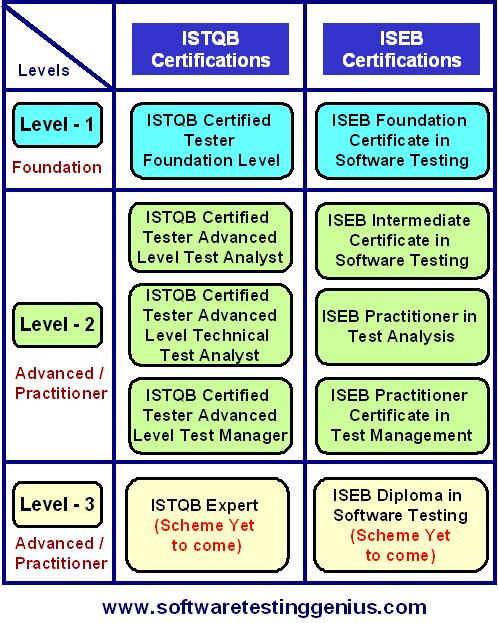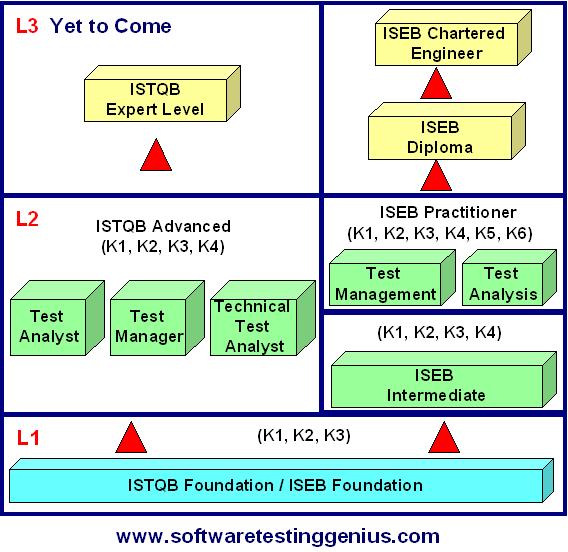Let us compare the two leading Role based certifications ISTQB & ISEB
In this article I am trying to provide sufficient details to the certification aspirants in our testing community which could help them decide on the certification suiting their individual needs and taste, while most important factor being their pocket.
There are lot many similarities among the two certifications � ISTQB & ISEB.
Both the certification schemes are broadly equivalent and enjoy great respect due to being of international recognition.
Quick introduction to Major Certifying Bodies – ISTQB & ISEB:
| ISTQB | ISEB |
|
|
|
| ISTQB (International Software Testing Qualification Board) is a Non-Profit organization.
It decides the core syllabus & defines standard guidelines for certification exams being conducted by national boards for conducting exams in their respective countries. |
ISEB (Information Systems Examination Body) is the qualifications arm of the British Computing Society. |
What are the Levels of Specialization you acquire with these certifications?
Broad hierarchical comparison among two streams is given below

Functional comparison different levels of certifications are:
Level – 1 (Foundation Level):
This is the entry-level certification offered by ISTQB as well as ISEB to the software testers. Both these certifications are equivalent, since their exams use the same international level syllabus and glossary of terms defined by ISTQB.
It provides an introduction to the basics or the theory of testing & this aspect is tested through short multiple choice objective-type exam covering K-1, K-2 & K-3 skill levels described below.
These certification exams are administered at online-tests centers and other local examination bodies of various countries.
Level – 2 (Advanced / Practitioner Level):
At this level, ISTQB and ISEB operate on different schemes. Although both these schemes are quite similar & equivalent, since these too are built upon foundation level syllabus and the same glossary of terms defined by ISTQB. Hence testers have a choice to go in for either of these certifications.
Following table describes some of the key points of differences among various schemes at these levels.
Level – 3 (More Advanced / Practitioner Level):
At present such third level certification are not available. Both ISTQB and ISEB are contemplating on coming out with this most advanced level of certification schemes having different merits in due course of time.
Here ISTQB is likely to have different viewpoint from ISEB in following aspects.
| Vision of ISTQB | Vision of ISEB |
| # The aspirants for third level certification are being expected to concentrate more & more on detailed aspects of testing like test automation or performance testing.
# It is believed that experts of ISTQB are already engaged in formulating the syllabus & structure of exam. |
# To offer a full fledged diploma to the aspirants with a view to widen their perspective and be able to enhance their qualifications in other areas supported by ISEB.
# The ISEB has a large basket of qualification offerings covering areas like requirements engineering, project management, development & service management. |
Before going ahead with skill to skill comparison; let us briefly delve upon the various skill levels or knowledge levels for the testing industry being designated as K-Levels.
What are K-Levels of knowledge?
K-Levels or “Knowledge Levels” basically refers to the prescription of an upper limit of skills or knowledge essential for a particular certification.
Hierarchy of K-Levels is described in globally recognized Bloom�s Texonomy of learning. Reaching a particular K-Level means that the individual has successfully achieved some measurable & meaningful objectives.
How many K-Levels or learning objectives do we when talking about test certification?
K-Levels begins at K-1 being the kindergarten level of learning in testing & ending up at K-6 with specialized knowledge as described in the Following Article
All About K-Levels or Learning Objectives extensively talked during prestigious certifications
Pictorial comparison of various schemes by ISTQB & ISEB with Knowledge levels acquired on our career path are:

Salient features of various Level �1 & 2 Certification Schemes by ISTQB
| Feature | Foundation Level (Common for ISTQB & ISEB) |
ISTQB Certified Tester Advanced Level: Test Manager | ISTQB Certified Tester Advanced Level: Test Analyst | ISTQB Certified Tester Advanced Level: Technical Test Analyst | |
| 1 | Pre -requisites | None | Foundation | Foundation | Foundation |
| 2 | Exam Duration | 1 Hr. | 3 Hrs. | 3 Hrs. | 3 Hrs. |
| 3 | Learning Levels | K1, K2, K3 | K1, K2, K3,K4 | K1, K2, K3,K4 | K1, K2, K3,K4 |
| 4 | Examining Body (s) | ISEB | ITB / Local Testing Board | ITB / Local Testing Board | ITB / Local Testing Board |
| 5 | Current syllabus issued on | 12th April 2007 (v2007) | Oct 2007 (v2007) | Oct 2007 (v2007) | Oct 2007 (v2007) |
| 6 | Exam format | Multiple Choice | Multiple Choice | Multiple Choice | Multiple Choice |
| 7 | Number of Questions | 40 | 40 | 40 | 40 |
| 8 | Type of Questions | Independent Multiple Choice | Pick �N� Mix & Scenario Based | Pick �N� Mix & Scenario Based | Pick �N� Mix & Scenario Based |
| 9 | Min. %age to Pass | 65% | 65% | 65% | 65% |
| 10 | Exam Compa – rability across different countries | Each ISTQB Testing Board and ISEB prepare their own exam papers | Each ISTQB Testing Board and ISEB prepare their own exam papers | Each ISTQB Testing Board and ISEB prepare their own exam papers | Each ISTQB Testing Board and ISEB prepare their own exam papers |
| 11 | What to do After this | ISTQB Certified Tester Advanced Level or ISEB Intermediate | None at the moment � Expert Level not Available yet | None at the moment � Expert Level not Available yet | None at the moment � Expert Level not Available yet |
| 12 | Availability on Public Schedule | Yes | Yes | Yes | No |
| 13 | Exam Fee per person | Defined by ITB / Local Testing Board | Defined by ITB / Local Testing Board | Defined by ITB / Local Testing Board | Defined by ITB / Local Testing Board |
Salient features of various Level �1 & 2 Certification Schemes by ISEB
| Feature | ISEB Intermediate | ISEB Practitioner � Test Management | ISEB Practitioner � Test Analysis | |
| 1 | Pre-requisites | Foundation | Intermediate | Intermediate |
| 2 | Exam Duration | 1 Hr. | 2 Hrs. | 2 Hrs. |
| 3 | Learning Levels | K1, K2, K3,K4 | K1, K2, K3,K4,K5,K6 | K1, K2, K3,K4,K5,K6 |
| 4 | Examining Body (s) | ISEB | ISEB | ISEB |
| 5 | Current syllabus issued on | June 2008 (Version 1.3) |
June 2008 (Version 2.0) |
June 2008 (Version 2.0) |
| 6 | Exam format | Multiple Choice | Essay Style | Essay Style |
| 7 | Number of Questions | 40 | 40 | 40 |
| 8 | Type of Questions | Scenario Based Multiple Choice | Written Question & Answer | Written Question & Answer |
| 9 | Min. %age to Pass | 60% | 60% | 60% |
| 10 | Exam Comparability across different countries | Same core papers are used internationally | Same core papers are used internationally | Same core papers are used internationally |
| 11 | What to do After this | Practitioner in Test Analysis or Practitioner in Test Management | None at the moment � Expert Level not Available yet | None at the moment � Expert Level not Available yet |
| 12 | Availability on Public Schedule | Yes | Yes | Yes |
| 13 | Exam Fee per person | Defined by ISEB / Local Body | Defined by ISEB / Local Body | Defined by ISEB / Local Body |
Many More Articles on Career Building in Testing

An expert on R&D, Online Training and Publishing. He is M.Tech. (Honours) and is a part of the STG team since inception.

deeply appreciate your help
Hi,
A very Useful info provided. Many Thanks. But When you suggest for doing any one among, which is best to pratice to attain carrier growth?